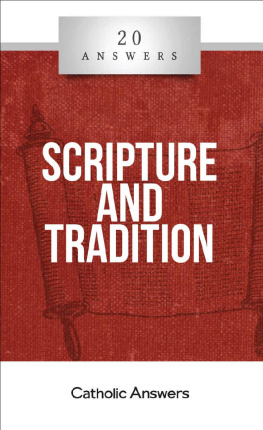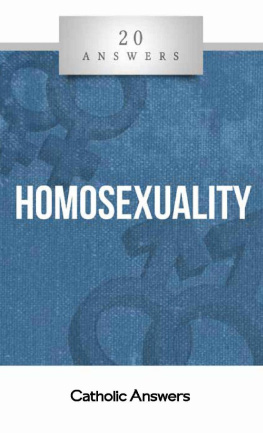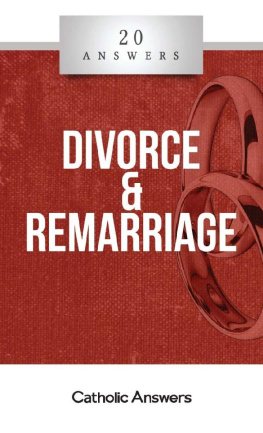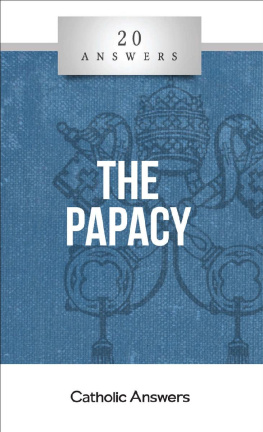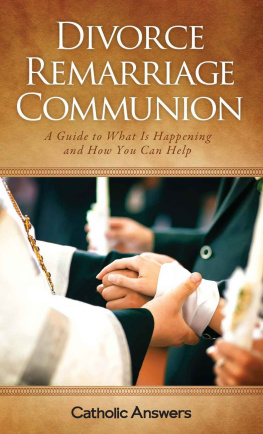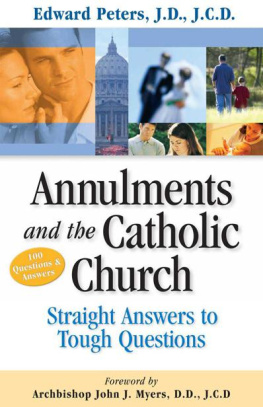Jim Blackburn - 101 Quick Questions with Catholic Answers: Marriage Divorce and Annulment
Here you can read online Jim Blackburn - 101 Quick Questions with Catholic Answers: Marriage Divorce and Annulment full text of the book (entire story) in english for free. Download pdf and epub, get meaning, cover and reviews about this ebook. year: 2012, publisher: Catholic Answers, genre: Religion. Description of the work, (preface) as well as reviews are available. Best literature library LitArk.com created for fans of good reading and offers a wide selection of genres:
Romance novel
Science fiction
Adventure
Detective
Science
History
Home and family
Prose
Art
Politics
Computer
Non-fiction
Religion
Business
Children
Humor
Choose a favorite category and find really read worthwhile books. Enjoy immersion in the world of imagination, feel the emotions of the characters or learn something new for yourself, make an fascinating discovery.

- Book:101 Quick Questions with Catholic Answers: Marriage Divorce and Annulment
- Author:
- Publisher:Catholic Answers
- Genre:
- Year:2012
- Rating:3 / 5
- Favourites:Add to favourites
- Your mark:
- 60
- 1
- 2
- 3
- 4
- 5
101 Quick Questions with Catholic Answers: Marriage Divorce and Annulment: summary, description and annotation
We offer to read an annotation, description, summary or preface (depends on what the author of the book "101 Quick Questions with Catholic Answers: Marriage Divorce and Annulment" wrote himself). If you haven't found the necessary information about the book — write in the comments, we will try to find it.
101 Quick Questions with Catholic Answers: Marriage Divorce and Annulment — read online for free the complete book (whole text) full work
Below is the text of the book, divided by pages. System saving the place of the last page read, allows you to conveniently read the book "101 Quick Questions with Catholic Answers: Marriage Divorce and Annulment" online for free, without having to search again every time where you left off. Put a bookmark, and you can go to the page where you finished reading at any time.
Font size:
Interval:
Bookmark:

101 Quick Questions with Catholic Answers
Marriage, Divorce, and Annulment
101 Quick Questions with Catholic Answers
Marriage, Divorce, and Annulment
Jim Blackburn
C ATHOLIC
A NSWERS
PRESS
San Diego
2010
101 Quick Questions with Catholic Answers
Marriage, Divorce, and Annulment
2011 by Catholic Answers, Inc.
All rights reserved. Except for quotations, no part of this book may be reproduced or transmitted in any form or by any means, electronic or mechanical, including photocopying, recording, uploading to the Internet, or by any information storage and retrieval system, without written permission from the publisher.
Published by Catholic Answers, Inc.
2020 Gillespie Way
El Cajon, California 92020
1-888-291-8000 orders
619-387-0042 fax
catholic.com
Cover by Devin Schadt
Interior design by Russell Design
ISBN 978-1-938983-13-9
INTRODUCTION
Human beings have a history of botching it when it comes to marriage, so it should come as no surprise that the Church has found it necessary to devote so much of its law to it. The Old Testament is filled with examples of concubinage, adultery, divorce, serial marriages, and polygamyand thats among Gods chosen people. But Jesus expects his followers to get it right when it comes to marriage, the way God originally intended it (cf. Mk 10:1-12).
The Catholic Church takes this seriously and so has instituted laws governing marriage for Catholics. The Church has the authority to teach and make laws about marriage because Jesus gave it. He said, first to Peter and later to the all the apostles, Whatever you bind on earth shall be bound in heaven, and whatever you loose on earth shall be loosed in heaven (Mt 16:19; 18:18). With these words he gave our first pope and first Church hierarchy, among other things, the authority to enact laws which the faithful are obliged to observe:
The power to bind and loose connotes the authority to absolve sins, to pronounce doctrinal judgments, and to make disciplinary decisions in the Church. Jesus entrusted this authority to the Church through the ministry of the apostles and in particular through the ministry of Peter, the only one to whom he specifically entrusted the keys of the kingdom. ( Catechism of the Catholic Church, 553)
Today, the Churchs Code of Canon Law contains 111 individual canons governing marriage. This may sound like a lot, but compared to the number of marriage laws civil governments impose on their citizens it is not. Even so, these canons represent more than six percent of the 1,752 canons contained in the Code .
These laws are there for our benefit, to help us treat the institution of marriage and the sacrament of matrimony with the dignity and respect it deserves. But while these laws are helpful, they often can be misunderstood or difficult to follow. Not a few Catholics today find themselves facing marriage-related situations theyre not sure how to deal with in a way that conforms to Church teaching and law.
May I attend this wedding? Can I marry this person? Is my marriage valid? Can I get a divorce? May I still receive Communion? Do I need an annulment? What about remarriage? The list of questions seems endless. Indeed, marriage-related questions are one of the most common topics dealt with by Catholic apologists.
In this volume, I have compiled 100 questions representative of the spectrum of marriage-related questions the Catholic Answers apologists, including myself, have answered over the years. I hope these questions and answers will help you to more fully understand the Catholic Churchs teaching and laws concerning marriage so that you can be assured of always treating marriage with the dignity and respect that God originally intended for this sacred institution.
Jim Blackburn
ABBREVIATIONS
CCC Catechism of the Catholic Church
CIC Code of Canon Law
RSV Revised Standard Version
Weddings/Who Can Wed
Q: Why cant Catholics get married outdoors? We want to get married outdoors where God made everything, and we can be surrounded by his creation.
A: Customs differ widely between cultures regarding the place of celebration for marriage. In Western culture, weddings traditionally take place in a church to symbolize the sacred nature of the act being performed. Thus the Code of Canon Law specifies that:
1. Marriage between Catholics or between a Catholic and a baptized non-Catholic party is to be celebrated in a parish church; with the permission of the local ordinary or the pastor, it can be celebrated in another church or oratory.
2. The local ordinary can permit marriage to be celebrated in some other suitable place.
3. Marriage between a Catholic party and a non-baptized party can be celebrated in a church or in some other suitable place. (CIC 1118)
Note that a distinction is drawn between the marriage of baptized individuals ( 1-2) and marriage between a baptized and non-baptized party (3). This suggests that the stronger requirement for celebration in a church in the former case is intended to emphasize the sacramental character of the marriage, since the former marriage is sacramental while the latter is not.
It is also generally the case that a Catholic marriage is celebrated in the context of a Mass, and the Mass must normally be celebrated in a sacred (i.e., consecrated) place (CIC 932 1). Out-of-doors doesnt count.
Q:My fianc and I would like to have a medieval-themed wedding and nuptial Mass, but our parents are disappointed with our plans and complain that a theme is inappropriate for a Catholic wedding. Is this true?
A:Your parents may fear that your chosen theme will undermine the sense of the sacredness of the event. This is a particularly valid concern when it comes to the Mass itself, where the focus needs to be clearly on the sacraments rather than on any theme. The reception, on the other hand, is an appropriate place for individual expression. In making your plans, keep in mind that you want your guests to notice more that it was a Catholic wedding than that it was a theme wedding.
Q:Is it true that the wedding march song cannot be played during a Catholic wedding?
A:Many Catholic parishes recommend that The Bridal Chorus from Richard Wagners opera Lohengrin not be used because it is secular music. Ideally, only liturgical music should be used during a Catholic wedding. However, some parishes are more lenient on the issue than others and will allow secular classical music. A prospective couple should check with the wedding coordinator of the parish where they are to marry to determine local protocol.
Q:I heard that a bishop allowed a nun to marry a couple. Does the bishop have the authority to do this?
A:The Code of Canon Law makes provision when certain conditions exist for lay persons, including nuns, to assist at weddings:
Where there is a lack of priests and deacons, the diocesan bishop can delegate lay persons to assist at marriages, with the previous favorable vote of the conference of bishops and after he has obtained the permission of the Holy See. (CIC 1112)
Q:Can a practicing Catholic officiate at a civil wedding ceremony?
A:Yes, a Catholic could preside at a civil wedding ceremony under some circumstances:
1.The couple must be non-Catholics not bound by Catholic marital law.
2.There must be no obvious impediments to their marriage (e.g., previous marriage, close blood relationship).
3.The Catholic must be authorized by the state to officiate at civil wedding ceremonies (e.g., judge, justice of the peace, other recognized official).
Next pageFont size:
Interval:
Bookmark:
Similar books «101 Quick Questions with Catholic Answers: Marriage Divorce and Annulment»
Look at similar books to 101 Quick Questions with Catholic Answers: Marriage Divorce and Annulment. We have selected literature similar in name and meaning in the hope of providing readers with more options to find new, interesting, not yet read works.
Discussion, reviews of the book 101 Quick Questions with Catholic Answers: Marriage Divorce and Annulment and just readers' own opinions. Leave your comments, write what you think about the work, its meaning or the main characters. Specify what exactly you liked and what you didn't like, and why you think so.

